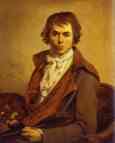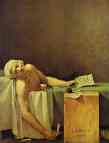Olga's Gallery
Dear Friends of Art,
 During
the last fortnight we have published a collection of works by a French
artist Jacques-Louis David, the foremost
Neo-Classical painter. David actively participated in the French Revolution:
he was a deputy of the Convention from Paris and as such voted for the
death of Louis XVI in 1793; he supported Robespierre’s and the left radicals’
regime; he was a member of the Committee of Public Safety and artistic
director of the great national festivals. These activities were not the
only contribution of David into the course of revolution. Some of his works,
of course, were a revolutionary propaganda of the time. Thus his famous
Death of Marat, a masterpiece
of its own, contributed much in establishing the historical reputation
of this awful man as a hero and a revolutionary martyr.
During
the last fortnight we have published a collection of works by a French
artist Jacques-Louis David, the foremost
Neo-Classical painter. David actively participated in the French Revolution:
he was a deputy of the Convention from Paris and as such voted for the
death of Louis XVI in 1793; he supported Robespierre’s and the left radicals’
regime; he was a member of the Committee of Public Safety and artistic
director of the great national festivals. These activities were not the
only contribution of David into the course of revolution. Some of his works,
of course, were a revolutionary propaganda of the time. Thus his famous
Death of Marat, a masterpiece
of its own, contributed much in establishing the historical reputation
of this awful man as a hero and a revolutionary martyr.
Our today's letter is about the famous revolutionary, Jean-Paul Marat,
and his brother, David Marat, unknown to the majority of mankind.
Sometimes Strange Relations Happen…
The only passion of my life was love for glory, - Jean-Paul Marat once admitted. He chased after glory all his life and caught it in the end…
Jean-Paul tried everything. He began with astronomy, when it bored him to death he switched to physics. Severely criticizing Newton, Marat demanded a revolution in natural sciences. But, fortunately or unfortunately, a revolution in science is a much more difficult business, than in a society. As a result the physicist-revolutionary was just mocked by the serious scientists.
Anatomy became the new victim of Marat. His first exercises were on corpses, but very soon he switched to living beings. He parried all criticism, “You say, you don't like to see innocent animals under the scalpel? My heart is as kind as yours, and I don't like to see their sufferings. …. It's impossible to reach your goal of making a lot of good, if you don't make at least a little evil. Only this way you can become a benefactor of mankind.” The ‘benefactor’ stated that he would never have done the important discoveries, if he had not cut off the heads and limbs of lots of animals. At last he made his “discovery”: Marat was looking for a soul and found it in the cerebral cortex. Old Voltaire said sarcastically, that it would have been better to say that its apartment was not known, than state that it was in a certain corner, “Leave it to our merciful Lord – He ordered a room for soul, but never appointed us to be its landlords.” These arguments could not stop the “benefactor of mankind” and he switched to medicine. ‘Marat is a charlatan, who sells different rubbish as medical panacea,’- his contemporary wrote.
Bitter disappointments and mockery set Marat to his writing table. He produced about 10 volumes of essays in attempt to destroy many of the generally accepted ideas of his time. Newspapers, journals and publishers were soon so irritated and scared by the name of this prolific author that he had to send his manuscripts anonymously, but this didn't help either, and he was rejected everywhere. For 30 years the “benefactor of mankind” was not acknowledged, led a poor life, envying all the great and famous people of the world.
He got seriously ill and nearly died. Would anyone have dropped a tear? It might have been his greatest contribution to the benefit, if not of the whole mankind, at least of France. But for the French Revolution Jean-Paul Marat would have remained a hero of funny historical anecdotes… The French Revolution started and at last Marat caught his fortune.
He started publishing his radical paper L’ami du people (The Friend of the People), which provoked and justified revolutionary violence. When the poor and hungry people became disappointed in revolutionary reforms, which didn't change anything in their lives they saw that Marat was as poor and as hungry as they were. Exhausted and deceived, people didn't want to believe the leaders in powdered wigs, they were looking for somebody they could trust and they found him. The citizen Marat was like them and besides he knew perfectly well who was guilty and what to do to overcome their miseries.
“Look around! You've been betrayed! You're hungry, while there are a lot of goods in stores… Your government, ninnies and cowards, are afraid to set a revolutionary order. They've betrayed us to aristocrats, moneylenders, and profiteers… We'll clean ourselves! All parasites to the guillotine! That is the way to save the Revolution!” In 1792 Marat was elected a deputy of the Convention. With Robespierre and Danton he overthrew the Girondins and helped to instigate the Reign of Terror.
The computer analysis, held in France in 1993, showed that during the Reign of Terror among the executed “enemies of the nation” only 9% were aristocrats and the representatives of the 2nd estate; 91% were the citizens of the third estate, who were the main power of the Revolution, and whose benefit was its main reason and goal; 28% among them were peasants and 30% workers. (L. Tretyakova, see bibliography at the end)
 On
13 July 1793 Marat was assassinated by Charlotte Cordey. He was already
very ill and could work only sitting in his bath, he would have died very
soon by himself…
On
13 July 1793 Marat was assassinated by Charlotte Cordey. He was already
very ill and could work only sitting in his bath, he would have died very
soon by himself…
The genius of David immortalized the bloody leader, made him look noble and just, made him a revolutionary martyr.
Meanwhile in far and cold Russia there lived David Marat (1756-23.9.1821), the brother of the revolutionary. He came to Russia in 1784 and entered imperial service. In 1793, with his ‘highness imperial permission’ David Marat changed his name into David Ivanovich Boudrie. In 1806, David Ivanovich adopted the Russian citizenship. In 1811, he was appointed a professor of French literature to The Lyceum in Tsarskoe Selo. His very first students were young gentlemen: Alexander Pushkin (Russian greatest poet), Ivan Puzshin (poet and revolutionary), Anton Delvig (poet and publisher), Wilhelm Kühelbecker (poet and revolutionary), Prince Alexander Gorchakov (diplomat and Chancellor of the Russian Empire, the iron opponent of Bismarck). The students loved him, respecting him as “a man of educated wit, noble heart, model gentleness and good nature” (Alexander Pushkin).
We failed to find any depiction of David Ivanovich Boudrie, and only specialists in Russian history of the early 19th century could remember the name of this remarkable man and teacher, who contributed to Russian culture through his students.
The philosophical question arises, whose contribution to the benefit
of mankind of these two brothers is greater? Everyone should decide by
him/herself.
Bibliography:
History of the French Revolution. by Thomas Carlyle. Harper
& Brothers.
To Die for Charlotte from Beauties Never Die. by Ludmila
Tretyakova. Moscow. 1998.
Pushkin Encyclopedia. Moscow. 1999.
David by Simon Lee. Phaidon. 1999.